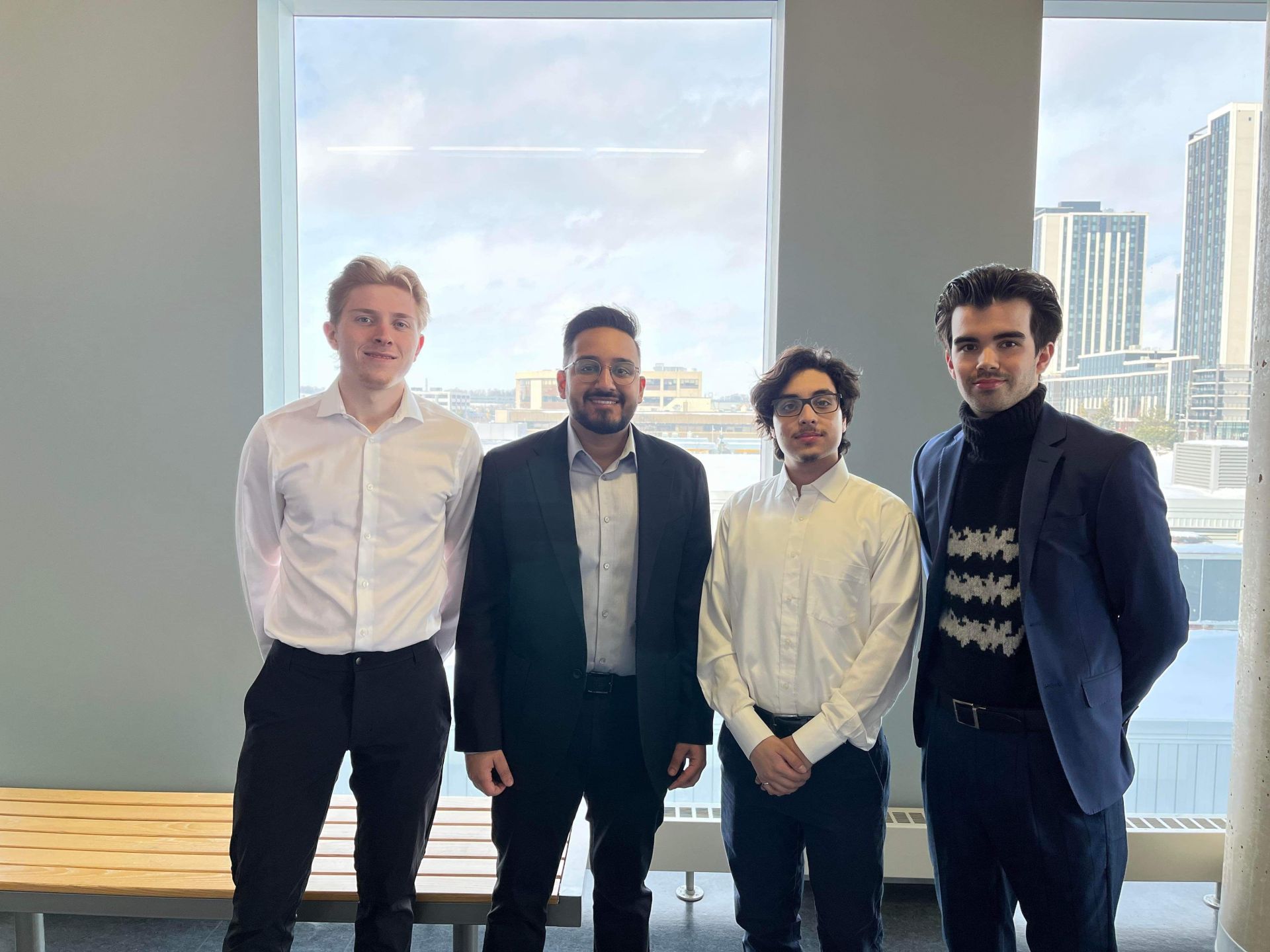CAPSTONE DESIGN PARTICIPANTS

Abin Varghese

Amrita Kaur

Shannon McNeil
Radioactive Species Capture Via Bubble Column For Nuclear Power Plant Decommissioning
16
The decommissioning of nuclear power plants involves the use of dismantling pipes via plasma torch, which generates radioactive aerosols, namely sodium, iron, nickel, and tritium. Our project involved the design, modeling and scale-up of a bubble column to efficiently capture these species to reduce radioactive contamination and reduce the dosage released to plant workers and the environment.
Faculty Advisor: Dr. William Anderson
Partner Organization/Industry or Government Mentor: Dr. Glenn Harvel, Ontario Tech University

Tina Nia

Chelsea Yang

Chris Tran

Hao Yu Zhang
OP Solutions
17
Orange juice production generates an enormous amount of waste every year, yet the peels contain substantial amounts of vitamins, essential oils, and other useful compounds. Our aim is to make this process more sustainable by extracting these compounds in addition to cellulose, fibre, and pectin from the peels. This can be achieved by utilizing a membrane pervaporization extraction process. The resulting extracts can be used to elevate existing products.
Faculty Advisor: Dr. Xianshe Feng

Duo Sun

Thomas Chen

Songbo Cui

Jingtian Liu

Jin Yun Zhu
Beyond Box
18
To pursue a healthier and more economical lifestyle, many people bring lunch to school or the workplace. Current insulating lunch containers only focus on keeping the food hot, but that is not ideal for young children as they can get burned. Therefore, the objective of this project is to design a food container that ensures the food will be at a safe temperature for young children when it is lunchtime.
Faculty Advisor: Dr. Jason Grove

Matthew Dutaud, Arsalan Chughtai, Faique Ahmad, Jeffrey Skidmore
Reduction of Agricultural Plastic Waste through Pyrolysis
19
Due to their contaminants and large volume, agricultural plastics are often disposed of wastefully instead of entering recycling programs. This project assesses the feasibility of implementing a pyrolysis process to extend the usefulness of agricultural plastics, using LLDPE bale wraps as a feedstock. The process generates liquid and gaseous hydrocarbon mixtures which can be used as fuel sources. The designed process consists of pre-treatment, a pyrolysis reactor, and a separation system. The feasibility of the project is determined by economic, environmental, and safety factors.
Faculty Advisor: Dr. Jason Grove

Elizabeth Mackay

Faith Rowntree

Kendall Magro
Modular Methane Pyrolysis for Hydrogen Production
20
Natural gas pyrolysis is a promising new technology for hydrogen production. The goal of our project is to design a modular hydrogen production unit that minimizes emissions while creating a versatile hydrogen source. For this project, we have decided to model a plasma-driven methane pyrolysis unit that efficiently produces high-purity hydrogen without the CO2 emissions associated with other technologies. Aspen Plus will be used to model the process and determine the required energy, environmental impact, and cost associated with the process.
Faculty Advisor: Dr. Boxin Zhao
Partner Organization/Industry or Government Mentor: Suncor Energy

Matthew Baun

Peter Greuel

Aranjan Gnanachandran

Aden Mohammed
Nuclear SMR Implementation in Oil Sands
21
The steam-assisted gravity drainage process used in the extraction of crude oil involves producing substantial amounts of high-pressure steam using natural gas combustion. This process is costly and produces significant amounts of greenhouse gas emissions. Our project consists of performing a feasibility study for the implementation of nuclear small modular reactors to produce steam which will significantly reduce natural gas combustion on-site and push these sites towards net-zero. The study will include analyzing the technology’s impacts, energy balance, cost, and greenhouse gas emission models.
Faculty Advisors: Dr. Ali Elkamel, Dr. Hamid Hamedaani